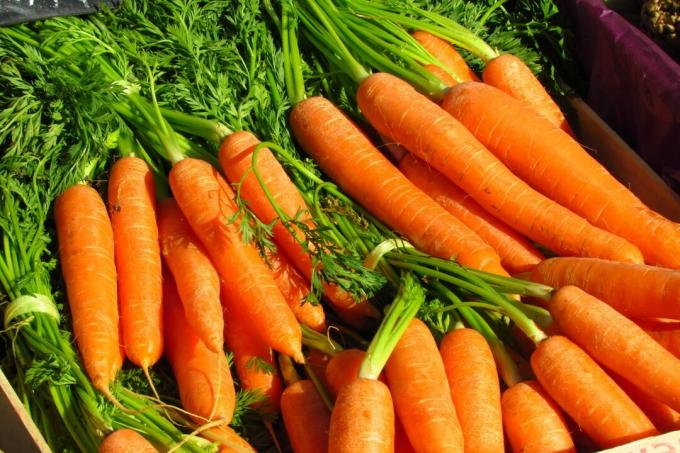A distinction is made between late and early carrot varieties. We'll give you an overview of the best varieties and give you tips on colorful carrots.

Carrots or the shorter carrots (Daucus carota), should not be missing in any vegetable garden. The huge selection of varieties sometimes makes it not that easy to choose a suitable one.
contents
- Types of carrots: how do you distinguish them?
-
The best varieties of carrots to grow
- Carrot varieties for the balcony or terrace
- Early ripening carrots
- Medium-ripe carrots
- Late ripening carrot varieties
Types of carrots: how do you distinguish them?
The numerous types of carrots differ in shape, taste, color and shelf life. For the hobby gardener, it is often of particular interest which varieties are sown and harvested when and which types of carrot are easy to store. In general, the cultivation time of the carrots is divided as follows:
- Early carrots: 70-90 days from seed to harvest
- Summer carrots: 110-135 days from sowing to harvest
- Late carrots / carrots for storage: 170-220 days from sowing to harvest
In addition, we will introduce you to types of carrots which, in terms of their growth and shape, are ideally suited for cultivation in small spaces.
Tip: The terms carrot and carrot are often used interchangeably, although this is not entirely true: as Carrots are the very short, almost radish-shaped growth forms such as the ‘Pariser variety Market'.

The best varieties of carrots to grow
Carrot varieties for the balcony or terrace
- ‘Adelaide (F1) ’: Early, compact carrot plant with small roots; ideally suited for cultivation on the balcony or terrace.
- ‘Caracas‘: Variety of the Chantenay type *; tiny, conical roots with a delicate taste.
- ‘Kuroda‘: Early variety with intensely colored orange roots; excellent taste and delicate in texture; recommended variety for raw vegetable salads.
- ′ Nandor F1 ′: Compact carrot variety with good properties; suitable for cultivation in flower pots, on the balcony and on the terrace.
- ′ Parisian Market ′: Traditional, proven carrot with round, red-orange roots; particularly suitable for hobby cultivation with outstanding taste and delicate texture.
Early ripening carrots
- 'Chantenay': Early variety with a cylindrical shape and an intense orange color; as the name suggests, also a variety of the Chantenay type *.
- ′ Laguna F1 ′: Quite early variety with convincingly high yields; cylindrical to slightly blunt root ends.
- ′ Nantaise 2 ′: Well known variety with cylindrical roots and excellent aroma; Ripe early, but also well suited for storage in autumn.
- ′ Sugarsnax 54 F1 ′: Early carrot variety with high carotene content; very tender and can be eaten raw.
- 'Totem': Well-tried, timely variety with high yields; aromatic taste; strong color and high carotene content.

Medium-ripe carrots
- ′ Atomic Red ′: Long, thin carrot with pink to deep red roots; contains the tomato pigment lycopene and tastes strong and crisp.
- ′ Chantenay 2 ′: Medium-ripe variety, cylindrical-conical roots with high quality pulp; of the Chantenay type *.
- ′ Ingot F1 ′: Newer variety with high yield, good quality and tolerance to the carrot fly; the end of the carrot is slightly blunt and rounded.
- ′ Lunar White ′: White, elongated roots with a mild taste; presumably comes directly from wild carrots.
- 'Purple Haze F1': Extravagant, storable variety with a deep purple skin and an orange heart; Can be eaten raw with a good aroma and a very high carotene content.
You can grow the 'Purple Haze' carrot yourself with our Plantura vegetable growing kit. In addition to the seeds of four other colorful vegetables, it also includes a mini greenhouse, substrate, growing pots and plant labels. Cultivation is child's play!
Tip: Carrots need a loose, rather sandy soil without stones and compaction. A sufficient supply of potassium increases the yield and shelf life of carrots and improves the taste. If you don't have a perfect carrot soil in your garden, you can easily grow it in planters using potting soil with a high potassium content. One of these is ours, for example Plantura organic tomato & vegetable soil.
Late ripening carrot varieties
- 'Jaune Du Doubs / Da Forragio': Late, yellow variety from Italy with a very good yield and strikingly large roots; the firm texture of the carrot is more suitable for cooking than raw consumption; is also used as animal feed.
- ′ Flakker F1 ′: Late variety with good taste and excellent storage properties.
- 'Long red blunt ones without a heart 2 / Vollenda': Popular variety with good properties; high yields and aromatic taste; very good shelf life.
- ′ Red Giants 2 ′: Variety with high quality orange-red pulp; high yields; very good camp carrots.

* Chantenay-type varieties have shorter, tapered carrots. The taste is very aromatic and the carrots do not have to be peeled due to their delicate texture and extremely thin skin.
Have the desired varieties been selected and the garden prepared? Growing carrots is one of those things that can reduce the yield or the beauty of the harvest. That is why you will learn everything you need to know about the right one from us Growing carrots.
